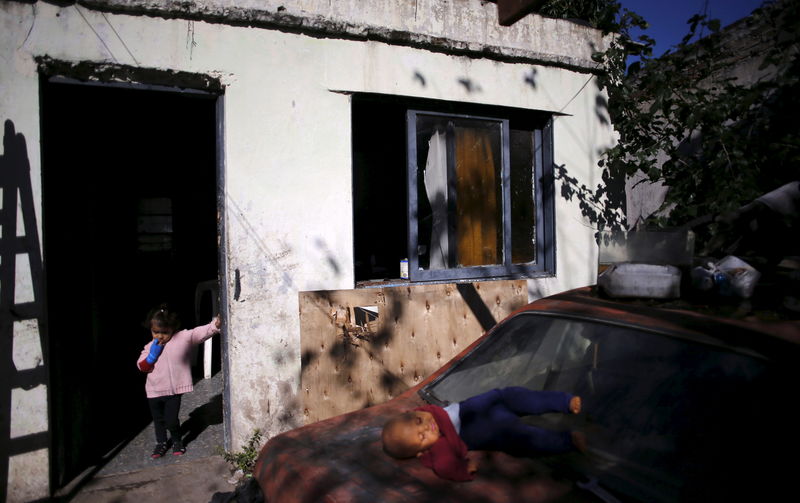By Brad Haynes and Nicolás Misculin
BUENOS AIRES (Reuters) - Argentine President Mauricio Macri repeats the aim of his economic policies so often it has become a mantra: "zero poverty".
But just five months into his term, Macri's policies have so far swelled the ranks of the poor, souring public opinion and raising the risk of backlash against an economic overhaul that is winning over foreign investors.
By sharply devaluing the peso, loosening price controls and hiking utility rates, Macri has sent inflation surging. Prices have risen more than 6 percent in Buenos Aires this month, private economists estimate, putting basic living costs out of reach for more families.
"You can feel the blow," said Raul Costilla, 42, a father of three in a slum south of Buenos Aires, who is struggling to make ends meet amid soaring bus fares and natural gas prices. "It's like social schizophrenia ... People voted for this government hoping for a recovery, but we're feeling the opposite."
Macri's center-right government promises to bring monthly inflation down to near 1 percent in the second half of the year, but their strategy of raising interest rates and trimming public payrolls has also increased unemployment and deepened the current downturn.
As a result, nearly 33 percent of Argentines now live in families unable to afford a basket of food and other basic goods, up from 29 percent at the end of 2015, according to researchers at the Catholic University of Argentina (UCA).
Dubious government statistics have made it harder to calculate average incomes and consumer prices in recent years, but Macri has previously cited UCA studies to decry the rising poverty rate under his predecessor, leftist leader Cristina Fernandez.
While most Argentines grant that Macri inherited a stagnant economy shackled by chronic inflation and hefty budget deficits, his campaign promises of a swift turnaround raised expectations and set a tight timeline for his tough medicine to start working.
"The honeymoon is giving way to demands for concrete solutions," said political analyst Pablo Knopoff, adding that Argentines would not tolerate a long wait for a recovery. "The president has set the deadline: the second half of the year."
Positive impressions of Macri have dropped from 71 percent when he took office in December to 53 percent this month, while negative impressions rose from 26 percent to nearly 43 percent, according to a survey by pollsters Ricardo Rouvier & Asociados.
'CROSSED THE RUBICON'
The thinning patience with Macri among Argentines stands in stark contrast with his enthusiastic reception on Wall Street.
Overwhelming investor demand for Argentina's first global bond issue in 15 years allowed the country to issue $16.5 billion in new sovereign debt this month, the biggest ever from an emerging market.
Indeed, many economists see the painful measures of Macri's first 100 days as a long-needed correction to the growing budget deficits and market interventions of his populist predecessor Fernandez.
Her tight caps on farm exports, energy bills and train fares shielded some corners of daily life from torrid inflation: Argentines could get more bread for their money, heat their homes for about $3 per month and ride the subway for 30 cents. But former businessman Macri has rolled back those controls in the name of free enterprise and healthier government finances.
"It's not nice to see your electric and gas bills double or triple," said BTG Pactual economist Andres Borenstein. "When you get the bill you swear, but you understand because you paid next to nothing for years."
He said Macri's bold moves, including a more than 25 percent currency devaluation, created a one-time inflationary effect but should yield recurring benefits from greater investment and a more competitive economy.
"Argentina has crossed the Rubicon," Borenstein said. "There's a very good chance that the hardship will be finished by the end of the second quarter. The recovery is going to be slow at first, so it's not going to be very noticeable."
NO BEEF
In the meantime, plenty of Argentine families are struggling to keep their heads above water.
Maria Duarte, a mother of nine living in a working-class suburb of Buenos Aires, has tried to stretch her government stipend since work dried up for her husband, an auto mechanic.
The rising price of beef, a staple of the Argentine diet, means the family hasn't fired up the grill in months. They get by on noodles and rice while the money lasts.
"When you run out of money, then what do you feed them?" she said, choking back tears. "You've got to keep the lights on, and that went way up. They cut off the gas because I couldn't pay."
Government pensions and stipends rose this month, partially compensating for rising prices, and Macri announced a one-time bonus and tax breaks for more than 8 million poor and retired Argentines.
Macri says the end of poverty in Argentina is the "horizon" for his policies, suggesting he sees it well beyond his reach.
"We have to be conscious of the starting point, the delicate situation in which we received the country," he said this month. "The state had lost all capacity to resolve the basics in Argentina, starting with poverty."
With each day that passes, however, Argentines are giving Macri less credit for the tough hand he was dealt.
"All they know how to do is blame the others ... for doing things that, really, I don't know if it was right or wrong, but at least I was doing alright," said Duarte, shaking her head. "I could pay the gas and electric bills at the end of the month. Now I don't even have gas."
